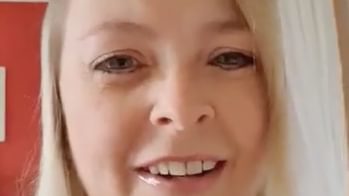Escaping the control of anorexia to find real freedom
Hope shares her journey to recovery from an eating disorder and decisions she makes every day to keep moving forwards in recovery
Hi. My name's Hope Virgo, and I am an author and mental health campaigner. I wanted to share just a little bit of my story and to share just a couple of ways that I manage my wellbeing now.
So I developed anorexia when I was about 12, 13 years old. The anorexia was like this best friend to me. It gave me this real value and sense of purpose every single day. It controlled me from the moment I got up in the morning to the moment I went to bed in the evening. And every time I did what it wanted me to do, I just felt absolutely amazing about life. Amazing about every single thing going on around me. Not only that, but it helped to numb every single bit of emotion. It gave me the sense of control and helped me to just keep going every single day when I was feeling so much pain and so much hurt.
At the time, I didn't realise what I was doing. I didn't realise how silly it was and how dangerous it was. And fast forward four years, and I'm standing in the entrance to a mental health hospital, my hair falling out, my heart failing, and I was at complete rock bottom. I thought back to the last six months in the run up to it, the kind of hospital appointments, the treatment, me being in constant denial, constantly on edge, constantly trying to work out whether I wanted to keep doing what that voice in my head was telling me to do, to then feeling so guilty that I was even questioning it.
I spent a year in hospital recovering from an eating disorder. But for me, I am still in that ongoing state of recovery. I still have to choose to recover every single day. I choose to keep eating. I choose to keep pushing forward. But there are things that I do that help me to feel more free, things that I do that really, really help.
The first thing is challenging myself. So every single day, I will challenge myself with food. I will make myself have something that I find maybe a little bit scary, a little bit unnerving, and I will push my boundaries to do that. Sometimes I feel a bit uncomfortable when I do this, but I know the more I do this, the better it is not just for me, but just in the broader sense of my entire recovery and for those people around me.
I also make sure that I keep talking. So whether that's through therapy or whether it was through talking to my friends, I've worked out who is in my support network, who is there when I need them, where I can offload on to? Who in my support network is there if I need to go out and have a good time in the evening? And who is there if I just want to kind of sit and just feel really, really bad? We need to work out who is in our life and who can offer that support when we need it. We need to remember that these people aren't there to fix us, but they're there to walk alongside us. And taking control of that and feeling empowered to tell people, I don't wanna be fixed, I just wanna tell you that I'm feeling a bit rubbish today. And the more we do that, the more we voice how we're feeling, even though it feels really, really hard at times, I promise you, it gets so much easier, and it massively, massively helps.
I spent my entire childhood not talking about how I felt, not sharing what I was going through. Because of that, I ended up in a mental health hospital for a year. You might think that's like a complete extreme, you might think that's just something that happened to me and would never ever happen to you. And yes, it might not happen to you. But one way to help prevent those feelings of hurt and pain inside you is to talk, is to find those words to say. I guarantee you that if you start talking and start sharing what you're going through, if you start showing those vulnerabilities, although yes, like I said, it might be scary, actually, you will start to open up that support network, but you will also give others that space to also be vulnerable with you.
And the final thing that I just wanted to flag as a way to really manage my wellbeing is to do exercise. So I've got a little bit of a hit and miss relationship with exercise. I used to be a very good long distance runner, and then got unwell and it was an obsession, it was something I had to do to punish myself. But now my relationship with exercise is a real positive. I do it to give myself that head space, to give myself a chance to kind of think and air my thoughts. It's what I do for my time and for my mental health. I don't do it anymore as a way to punish myself.
But doing it for the right reasons has massively helped not just my brain, but also my confidence levels and seeing what my body can do. Again, it can take time to have that shift.
And yes, there are still days when I wake up and I look in the mirror and I hate what I see. Or days when maybe I start to struggle a little bit. But I know that on those days I have those coping mechanisms in place to help me push further and further forward.
Whatever you're going through right now, whether you have a full blown eating disorder, whether you struggle with your body image, whether you struggle with your self worth, please, please keep talking, please hang on in there. And remember that things can get better. These feelings that you're feeling, whether it's real pain, whether it's real hatred, whether it's real torment, whatever it is, those feelings do pass. I used to never believe it when people told me that. But trust me, they really, really do.



